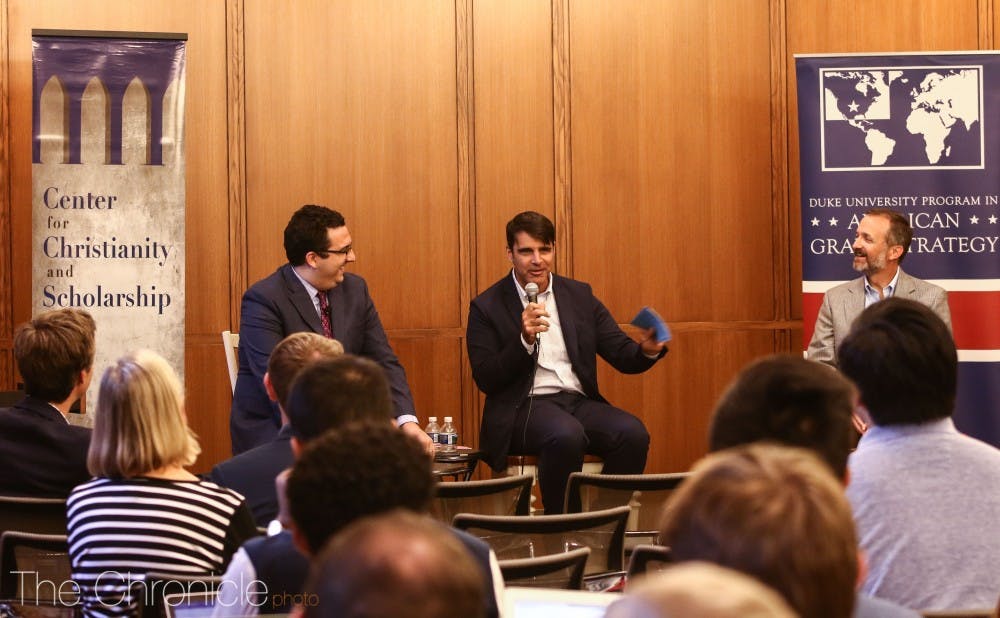There are two things the proverbial dinner guest should steer clear of—religion and politics.
But a panel hosted Oct. 2 pushed past that taboo and dove right in. The Duke Program in American Grand Strategy and the Center for Christianity and Scholarship hosted "Road of Hope? The Challenges of Faith in Politics." The event was intended to bring together people of faith on both sides of the aisle to discuss issues intersecting modern organized religion and the political process.
The host was Bob Crawford—a musician for the Avett Brothers who hosts the Road to Now podcast, which “traces personal and historical narratives that shape the modern world.” The conservative side was represented by Farr Curlin, Josiah C. Trent professor of medical humanities. Michael Wear—a former staffer for President Barack Obama who served in the White House’s faith-based initiative—was a liberal voice in the conversation.
“I met Senator Barack Obama in the lobby of a hotel just a couple days before he would officially announce that he was running for president," Wear said. "I told him I wanted to work for him because I had seen his 2004 speech…He said that we worshiped an awesome God in the blue states, and he talked about the idea that ‘I am my brother’s keeper.’ And 10 months later, I was in Iowa working on his campaign."
When discussing religious freedom, Curlin explained that religious people "feel less free to live out their faith when those teachings run counter to modern mores.” He said that under Obama, Christian traditionalism was undermined by progressive ideas.
“Obama’s support for gay marriage, the [Obergefell v. Hodges] decision and the increasingly ratcheted-up rhetoric of religious freedom as in opposition to people who are openly homosexual [or] transgender means that there is now less scope in public and in law to act publicly in a way that suggests that the traditional Christian teaching about sexuality is true," Curlin said. "I put some of the blame at the feet of President Obama and his administration.”
Wear noted that “there was a pressure building up during the course of the Obama administration that the administration didn’t adequately address.” One of Wear’s biggest talking points was refuting the idea that the Obama administration was attempting to undermine religion.
"One reason why it was such a big mistake that these issues weren’t confronted and talked about more openly—and resulted in slogans like 'war on religion' and 'war on women'—is that it actually helped religious conservatives feel like there were people waking up in the Obama administration every morning wondering ‘How do I destroy the church today?’" Wear said.
That was not happening, the former White House staffer said. For example, the motivation behind the contraceptive mandate in the Affordable Care Act was not "How do we restrict religious freedom today?" but "How do we expand access to contraceptives?"
At one point, Curlin heavily criticized the Obama administration for failing to uphold campaign promises to religious people, specifically on abortion.
“Obama never supported a single abortion restriction despite saying he would when he compelled every institution that has employees to provide for contraceptive services,” he said.
Inevitably, the discussion veered in the direction of President Donald Trump.
“It seems self-evident that a Christian should know that there is some trouble in being fully behind President Trump and his policies, even if they might have prudential reasons for voting for Trump," Curlin said.
When asked about the status of religious freedom under Trump, Curlin responded that Trump's impact varies for religions such as Islam. But for Christians, religious freedom is better under Trump's administration, he said.
In concluding the discussion, Wear provided insight on the state of political decisions in largely white evangelical communities.
“Evangelicals used to be the guardians of the idea that you can’t separate personal morality from public efficacy—you can't be a good leader in public and be a corroded person inside, human nature doesn’t work that way,” he said. “In 2011, only 30 percent of white evangelicals would have affirmed the idea that a candidate could have a moral or ethical failure in their personal life and still be an effective public leader. In 2016, that number shot up to 72 percent.”
He argued that scripture didn’t change, but rather the only thing that changed was that Donald Trump was the Republican nominee. The response from evangelicals was that "character doesn't matter," Wear said.
During the concluding question and answer session, a woman at the event asked about Christianity being adopted as a veil for racism in recent years.
“All you have to do is look at the numbers," Wear said. "The only reason why it is thought that 81 percent of evangelicals voted for Trump was because ‘white’ was in front of 'evangelical'…the most determinant factor in people’s vote was race."
Get The Chronicle straight to your inbox
Sign up for our weekly newsletter. Cancel at any time.

